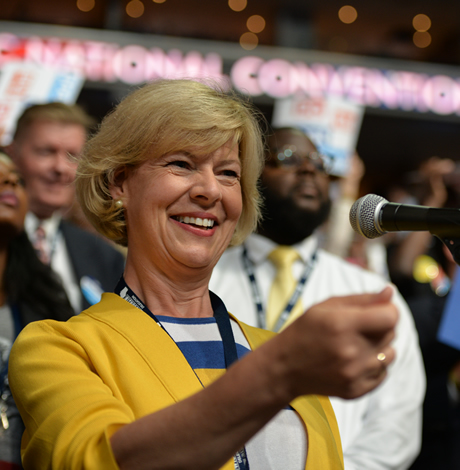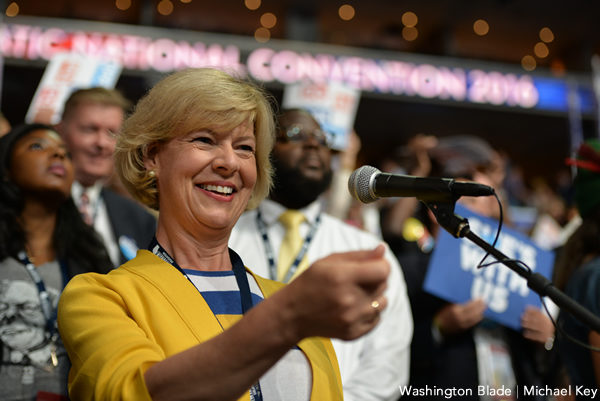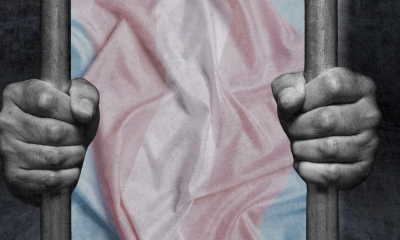News
Senate Dems take series of actions to assist LGBT youth, elders
Lawmakers call for reinstatement of survey questions, introduce LGBT elder legislation


Sen. Tammy Baldwin signed letters and introduced legislation aimed at helping LGBT youth and elders.
(Washington Blade file photo by Michael Key)
Senate Democrats took a series of actions Tuesday seeking to assist the LGBT community — one action for the LGBT youth, two others for LGBT elders — both of which are subgroups that have a history of unique challenges.
In a pair of letters dated Nov. 7, U.S. Sens. Robert Casey (D-Pa.), Tammy Baldwin (D-Wis.) and Patty Murray (D-Wash.) led 21 senators in calling on the Trump administration to ensure programs designed to combat youth homelessness reach LGBT people and include LGBT elders in health surveys.
Meanwhile, U.S. Sen. Michael Bennet (D-Colo.) — along with Sen. Jeff Merkley (D-Ore.), Edward Markey (D-Mass.) and Al Franken (D-Minn.) — introduced the LGBT Elder Americans Act, which seeks to improve services available for LGBT elders.
The letters, sent to both the U.S. Justice Department and the U.S. Department of Health & Human Services, bases its call to action on President Trump’s promise during his 2016 campaign to be a friend to LGBT people.
“During the campaign, President Trump said that he would ‘do everything in [his] power to protect LGBTQ citizens.’ We write to you because the administration is not living up to the president’s promise,” the senators wrote. “We urge you to reverse course on actions that will make it more challenging for programs you oversee to serve LGBTQ Americans.”
Specifically, the letter to the Justice Department expresses concern two federal grant programs that combat homelessness — DOJ’s Mentoring for Child Victims of Commercial Sexual Exploitation & Domestic Sex Trafficking Initiative and HHS’ Street Outreach Program — will no longer focus on LGBT youth because this year’s funding requirement “removed that requirement as well as all mentions of LGBTQ youth.”
“As LGBTQ youth are at a higher risk for running away and becoming homeless compared to their peers, and therefore more likely to be victimized, we are concerned about the effect these administration decisions would have on these vulnerable youth,” the letter says.
Meanwhile, the letter to the Department of Health & Human Services calls for restoration of questions allowing respondents to identify as transgender in the National Survey of Older Americans Act Participants as well as LGBT on the Centers for Independent Living Annual Program Performance Report. (HHS has previously removed the sexual-orientation question from the NSOAPP, but reinstated it under public pressure.)
“In order to ensure that key programs for older adults and people with disabilities are meeting the needs of the entire LGBTQ community, we once again reiterate our call for HHS to restore the gender-identity question to the NSOAPP and to collect information on sexual orientation and gender identity on the CILPPR,” the letter says.
Additionally, the letter expresses concern about the withdrawal of a proposed HHS rule that would have clarified same-sex spouses should are afforded equal rights in nursing homes that receive Medicare and Medicaid. That rule was widely seen as redundant after the U.S. Supreme Court ruling for marriage equality nationwide.
Neither the Justice Department, not the Department of Health & Human Services, responded to the Washington Blade’s request to comment on the letter.
Meanwhile, the LGBT Elder Americans Act, reintroduced by Bennet, would build on the Older Americans Act to include LGBT seniors as a vulnerable population and permanently establish the National Resource Center on LGBT Aging.
“Our laws and research are not current in addressing the unique needs of the aging generation of baby boomers,” Bennet said in a statement. “This legislation would provide LGBT seniors, who often face significant barriers to accessing health care, with targeted services and resources. By helping aging service organizations assist older LGBT adults and permanently establishing a National Resource Center, we will better meet the needs of the LGBT community.”
Baldwin, who’s running for re-election in the U.S. Senate next year and remains the only out lesbian in Congress, also emphasized the importance of the LGBT Elder Americans Act in a statement.
“We should guarantee all of our seniors access to the care that truly meets their needs and so I am proud to advance this legislation that will improve services and support for LGBT older adults,” Baldwin said. “Too many LGBT older adults carry the harmful physical and emotional health effects of having lived through a lifetime of discrimination. It is past time we do something about it and strengthen the Older Americans Act to better support our LGBT seniors.”
Last week, Rep. Suzanne Bonamici (D-Ore.) — along with Rep. Ted Deutch (D-Fla.) and Charlie Crist (D-Fla.) — introduced companion legislation in the U.S. House known as the Ruthie & Connie LGBT Elder Americans Act, named for two LGBT elders who continue to fight for LGBT equality.
Michael Adams, CEO of the LGBT elder group SAGE USA, commended the lawmakers for introducing the legislation in a statement.
“LGBT elders, whose courage in the face of danger and adversity paved the way for progress on LGBT equality in recent years, deserve to be taken care of as they age, no matter where in the United States they live,” Adams said. “Our LGBT elder pioneers did not lead the movement birthed at Stonewall by being silent. We at SAGE follow their example by raising our voices in support of the Ruthie & Connie LGBT Elder Americans Act of 2017 and to demand justice for this growing population.”
European Union
European Parliament resolution backs ‘full recognition of trans women as women’
Non-binding document outlines UN Commission on the Status of Women priorities

The European Parliament on Feb. 12 adopted a transgender-inclusive resolution ahead of next month’s U.N. Commission on the Status of Women meeting.
The resolution, which details the European Union’s priorities ahead of the meeting, specifically calls for “the full recognition of trans women as women.”
“Their inclusion is essential for the effectiveness of any gender-equality and anti-violence policies; call for recognition of and equal access for trans women to protection and support services,” reads the resolution that Erin in the Morning details.
The resolution, which is non-binding, passed by a 340-141 vote margin. Sixty-eight MPs abstained.
The commission will meet in New York from March 10-21.
A sweeping executive order that President Donald Trump signed shortly after he took office for a second time on Jan. 20, 2025, said the federal government’s “official policy” is “there are only two genders, male and female.” The Trump-Vance administration has withdrawn the U.S. from the U.N. LGBTI Core Group, a group of U.N. member states that have pledged to support LGBTQ and intersex rights, and dozens of other U.N. entities.
District of Columbia
Deon Jones speaks about D.C. Department of Corrections bias lawsuit settlement
Gay former corrections officer says harassment, discrimination began in 1993

Deon Jones says he is pleased with the outcome of his anti-gay bias lawsuit against the D.C. Department of Corrections that ended after five years on Feb. 5 with the D.C. government paying him $500,000 in a settlement payment.
The lawsuit, filed on his behalf by the American Civil Liberties Union of D.C. and the law international law firm WilmerHale, charged that Jones, a Department of Corrections sergeant, had been subjected to years of discrimination, retaliation, and a hostile work environment because of his identity as a gay man in clear violation of the D.C. Human Rights Act.
A statement released by the ACLU at the time the settlement was announced says Jones, “faced years of verbal abuse and harassment, from co-workers and incarcerated people alike, including anti-gay slurs, threats, and degrading treatment.”
The statement adds, “The prolonged mistreatment took a severe toll on Jones’s mental health, and he experienced depression, post-traumatic-stress disorder, and 15 anxiety attacks in 2021 alone.:
Jones said the harassment and mistreatment he encountered began in 1993, one year after he first began work at the Department of Corrections and continued for more than 25 years under six D.C. mayors, including current Mayor Muriel Bowser, who he says did not respond to his repeated pleas for help.
Each of those mayors, including Bowser, have been outspoken supporters of the LGBTQ community, but Jones says they did not intervene to change what he calls the homophobic “culture” at the Department of Corrections.
The Department of Corrections, through the Office of the D.C. Attorney General, which represents city agencies against lawsuits, and the mayor’s office, have so far declined to comment on the lawsuit and the half million-dollar settlement the city offered to Jones, who accepted it.
Among other things, the settlement agreement states that Jones would be required to resign from his job at the Department of Corrections. It also declares that “neither the parties’ agreement nor the District government’s offer to settle the case shall in any way be construed as an admission by the District that it or any of its current or former employees, acted wrongfully with respect to plaintiff or any other person, or that plaintiff has any rights.”
Scott Michelman, the D.C. ACLU’s legal director said that type of disclaimer is typical for parties that agree to settle a lawsuit like this. He said the city’s action to pay Jones a half million-dollar settlement “speaks louder than words.”
With that as a backdrop, Jones reflected on the settlement and what he says was his tumultuous 30-year career as an employee at the D.C. Department of Corrections in a Feb. 9 interview with the Washington Blade.
He and Michelman pointed out that Jones was placed on paid administrative leave in April 2022, one year after his lawsuit was filed. Among his upcoming plans, Jones told the Blade, is to publish a podcast that, among other things, will highlight the hardship he faced at the Department of Corrections and advocate for LGBTQ rights.
BLADE: What are your thoughts on this lawsuit settlement which appears very much in your favor?
JONES: That’s great. I’m happy. I’m glad to resign. It’s been a long time coming. It was the worst time it’s ever been. And I have advocated for the community for many, many years. And not only standing up for my rights but for the rights for others in the LGBTQ community.
And I’m just tired now. And my podcast will start soon. And I will continue to advocate for the community.
BLADE: Can you tell a little about that and when it will begin?
JONES: Once in April, once everything is closed my podcast will be starting. And that’s Deon’s Chronicle and Reveal. Yes, my own podcast.
BLADE: Since we have reported your attorney saying you have been on administrative leave since March of 2022, some in the community might be interested in what you have been doing since that time. Did you get another job or were you just waiting for this case to be resolved?
JONES: I was waiting for this to be resolved. I couldn’t work. That would violate policy and procedures of the D.C. government. So, I could not get another job or anything else.
BLADE: You have said under administrative leave you were still getting paid. You were still able to live off of that?
JONES: Yes, I was able to. Yes, sir. I used to do a lot of overtime. As a zone lieutenant for many years, I have supervised over 250 officers. I’ve also supervised over 25,000 inmates in my 30 years.
BLADE: How many years have you been working for the Department of Corrections?
JONES: It’s 30 years all together. I started down at the Lorton facility. Six facilities — I’ve worked for past directors, deputy directors, internal affairs. I’ve done it all.
BLADE: Do you have any plans now other than doing the podcast?
JONES: Well, to just do my podcast and also to write my book and my memoir inside of the house of pain, the house of shame — what I’ve been through. When I start my podcast off it will be stories — Part 1 through Part 4. And I will go back to the Lorton days all the way up to now. When it first started was sexual harassment and discrimination back down at Lorton. And I mean this has just been the worst time around.
BLADE: So, did you first start your work at the Lorton Prison?
JONES: Yes, I was at the central facility, which was the program institution.
MICHELMAN: Just for context. You may remember this, but the Lorton facility was where D.C. incarcerated people were held. So, that was part of the D.C. Department of Corrections.
BLADE: Yes, and that was located in Lorton, Va., is that right?
JONES: Right.
BLADE: Didn’t that close and is the main incarceration facility is now in D.C. itself?
JONES: Yes. And that closed in 2001.
BLADE: I see. And is the main D.C. jail now at a site near the RFK Stadium site?
JONES: Yes, sir. And next-door is the correctional treatment facility as well.
BLADE: So, are you saying the harassment and other mistreatment against you began back when you were working at the Lorton facility?
JONES: At the Lorton central facility. And they used to flash me too. When I say flash me like the residents, the inmates were flashing. And they [the employees] were flashing.
BLADE: What do you mean by flashing?
JONES: They take their penis out and everything else. I mean the sexual harassment was terrible. And I came out then down there. And I continued to advocate for myself and to advocate for other people who I was told were being picked on as well.
BLADE: As best you can recall, where and what year did that happen?
JONES: That was back in 1993 in April of 1993.
BLADE: The mayor’s office has declined to comment on the settlement and payment the city is giving you. Yet they have always said they have a strong policy of nondiscrimination protections for LGBTQ people in D.C. government agencies. But do you think that was not carried out at the Department of Corrections?
JONES: That’s a blatant reason why — I had 13 anxiety attacks. It was so blatant. Can you imagine? On the airwaves or the walkie-talkies — everybody had a walkie talkie — the captains and the majors and everything. And you transmit it to the command center or something like that. When you finish someone gets on the air and calls you a sissy or a fag.
They received so many complaints, and I also sent the mayor so many emails and begging for help. And they ignored it. They didn’t address any complaints at all. So, that’s bull.
BLADE: But now after you filed your lawsuit and you received this settlement do you think there will be changes there to protect the rights of other LGBTQ employees?
JONES: I hope so, because I have been defending community rights. For many years I have been advocating for different things and different services. And I’ve seen the treatment. There are a lot of mistreatments towards the community over there. And I have taken a stance for a lot of people in the community and protecting their constitutional rights as well as mine.
BLADE: What advice might you have for what the Department of Corrections should do to correct the situation that led to your lawsuit?
JONES: Well, what my advice for the department is they need to go back over their training. And they need to enforce rules against any acts of discrimination, retaliation, or sexual harassment. They need to enforce that. They’re not enforcing that at all. They’re not doing it at all. And this time it was worse than ever, then I’ve ever seen it. That you would get on the walkie talkie and someone would call you a fag or a sissy or whatever else or do evil things and everything. They are not enforcing what they are preaching. They are not enforcing that.
BLADE: Is there any kind of concluding comment you may want to make?
JONES: Well, I hope that this litigation will be a wakeup call for the department. And also, that it will give someone else the motivation to stand up for their rights. I was blessed to have the ACLU and WilmerHale to protect my constitutional rights. So, I am just really happy. So, I’m hoping that others will stand up for their rights. Because a lot of people in the community that worked there, they were actually afraid. And I had some people who actually quit because of the pressure.
Baltimore
‘Heated Rivalry’ fandom exposes LGBTQ divide in Baltimore
Hit show raises questions about identity, cultural representation

By JOHN-JOHN WILLIAMS IV | “Heated Rivalry,” the surprise gay hockey romance that has captivated global audiences and become a cultural phenomenon, has inspired sold-out parties celebrating the characters from the steamy series, including in Baltimore.
For some, love of the show has exposed the loss of a once-vibrant gay nightlife in Charm City and splintered its LGBTQ community. It also brings up layered questions about identity, cultural representation, and the limits of identity politics.
In Baltimore, the majority of the parties also appear to be missing a key ingredient that has been a part of the show’s success: gay men at the helm. Last month, women hosted a dance party at Ottobar, a straight establishment.
The rest of this article can be read on the Baltimore Banner’s website.




















